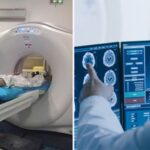Cancer is a dangerous disease, but early detection significantly improves the chances of successful treatment. Here are seven early warning signs that you shouldn’t ignore. If you experience any of these symptoms persistently or unusually, consult a doctor immediately.
Unexplained Weight Loss
Sudden weight loss (over 5kg in a short period) without changes in diet or exercise could indicate cancer, especially stomach, pancreatic, lung, or esophageal cancer.
Prolonged Fatigue
Persistent fatigue that doesn’t improve with rest may be related to various cancers, such as leukemia or colon cancer.
Unexplained Pain
Long-lasting pain in a specific body region without an apparent cause (such as injury) could signal bone, brain, or other cancers.

Skin Changes
Non-healing sores, changing moles, or unusual spots on the skin may indicate skin cancer, particularly melanoma.
Persistent Cough or Hoarseness
A persistent cough lasting over three weeks, hoarseness, or breathing difficulties unrelated to a cold or allergies could be signs of lung, laryngeal, or thyroid cancer.
Changes in Bowel Habits
Prolonged diarrhea, constipation, or blood in stool/urine could indicate colon, rectal, bladder, or kidney cancer.
Unusual Bleeding or Discharge
Abnormal bleeding (such as blood in stool, urine, or vaginal bleeding outside of menstruation) or discharge from the nipples may warn of breast, cervical, or other cancers.

Note that these signs don’t necessarily indicate cancer. However, if you experience one or more of these symptoms for more than two to three weeks, consult a doctor for an examination. Early detection and timely treatment are key to improving cancer cure rates.
Maintain a healthy lifestyle, undergo regular health check-ups, and listen to your body to protect your health effectively!
“Persistent Cough and Flu: Beware of These 4 Overlooked Signs of Lung Cancer”
Lung cancer is often diagnosed at a late stage, partly because its early signs and symptoms can be mistaken for those of the common cold, flu, or minor health issues. This often leads to individuals neglecting or overlooking these warning signs, missing the golden opportunity to detect and treat the disease in its early stages.





































